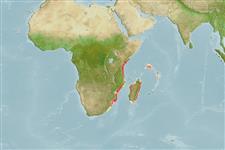>
Argentiniformes (Marine smelts) >
Microstomatidae (Pencil smelts)
Etymology: indica: Named for its type locality, Indian Ocean.
Eponymy: Fridtjof Nansen (1861–1930) was a Norwegian explorer, scientist, diplomat and later recipient of the Nobel Peace Prize. [...] (Ref. 128868), visit book page.
Environment: milieu / climate zone / depth range / distribution range
Ecologie
marien benthopelagisch; diepte 0 - 430 m (Ref. 41397). Deep-water
Western Indian Ocean: Mozambique.
Grootte / Gewicht / Leeftijd
Maturity: Lm ? range ? - ? cm
Max length : 10.7 cm mannelijk / geslacht onbekend; (Ref. 41397)
Korte beschrijving
Determinatiesleutels | Morfologie | Morfometrie
Dorsale zachte stralen (totaal) : 10; Anale zachte stralen: 9; Wervels: 47. Branchiostegal rays 4. Caudal peduncle length 2.0 times the depth. Anterodorsal distance is 48-52% SL. Anteanal distance is 46% SL; long head, about 21% SL. Unpigmented scale pockets; adipose fin almost completely black (Ref. 41397).
Levenscyclus en paargedrag
Maturiteit | Voortplanting | Paaien | Eieren | Fecunditeit | Larven
Kobyliansky, S.G., 1992. Two new species from the genus Nansenia (Microstomatidae, Salmoniformes) from the western Indian Ocean. J. Ichthyol. 32(7):30-36. (Ref. 41397)
Status op de Rode Lijst van het IUCN (Ref. 130435: Version 2024-1)
Gevaar voor de mens
Harmless
Gebruik door de mens
Tools
Speciale rapporten
Download XML
Internetbronnen
Estimates based on models
Preferred temperature (Ref.
123201): 16.9 - 25.3, mean 19.8 °C (based on 23 cells).
Fylogenetische diversiteitsindex (Ref.
82804): PD
50 = 0.5000 [Uniqueness, from 0.5 = low to 2.0 = high].
Bayesian length-weight: a=0.00389 (0.00180 - 0.00842), b=3.12 (2.94 - 3.30), in cm total length, based on all LWR estimates for this body shape (Ref.
93245).
Trofisch niveau (Ref.
69278): 3.3 ±0.4 se; based on size and trophs of closest relatives
Fishing Vulnerability (Ref.
59153): Low vulnerability (12 of 100).
